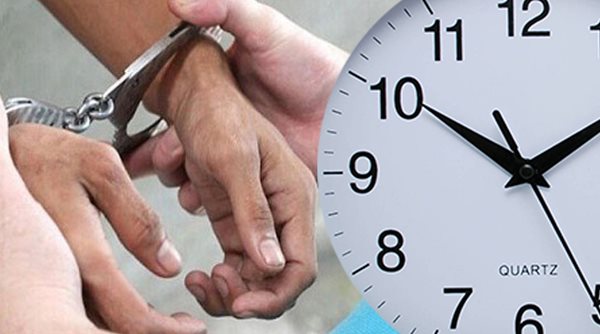Cases of non-application of time limit for criminal prosecution in Vietnam
What is the time limit for criminal prosecution? What are the cases of non-application of time limit for criminal prosecution in Vietnam? – Thanh Ha (HCMC)

Cases of non-application of time limit for criminal prosecution in Vietnam (Internet image)
1. What is the time limit for criminal prosecution?
- The time limit for criminal prosecution is a time limit set out by this document and upon the expiration of which the offender does not face any criminal prosecution.
- Time limits for criminal prosecution:
+ 05 years for less serious crimes;
+ 10 years for serious crimes;
+ 20 years for very serious crimes;
+ 20 years for extremely serious crimes.
- The time limit for criminal prosecution begins from the day on which the crime is committed.
During the time limit set out in Clause 2 of Article 27 of the Penal Code 2015, if the offender commits another crime for which the maximum sentence is over 1 year's imprisonment, the time limit for prosecution for the previous crime will be reset and begins from the day on which the new crime is committed.
During the time limit set out in Clause 2 of Article 27 of the Penal Code 2015, if the offender deliberately evades capture and a wanted notice has been issued, the time limit will begin when he/she turns himself/herself in or gets arrested.
(Article 27 of the Penal Code 2015)
2. Non-application of time limit for criminal prosecution in Vietnam
The statute of limitations for criminal prosecution does not apply to the following crimes:
- Infringement of national security specified in Chapter XIII of the Penal Code 2015;
+ High treason
+ Activities against the people's government
+ Espionage
+ Infringement upon territory
+ Rebellion
+ Terrorism to oppose the people's government
+ Sabotaging facilities of Socialist Republic of Vietnam;
+ Sabotaging implementation of socio-economic policies
+ Sabotaging implementation of solidarity policies
+ Making, storing, spreading information, materials, items for the purpose of opposing the State of Socialist Republic of Vietnam
+ Disruption of security
+ Disruption of detention facilities
+ Organizing, coercing, instigating illegal emigration for the purpose of opposing the people's government
+ Illegal emigration for the purpose of opposing the people's government
- Disturbing the peace, crimes against humanity and war crimes specified in Chapter XXVI of the Penal Code 2015;
+ Disruption of peace, provocation of war of aggression
+ Crimes against humanity
+ War crimes
+ Recruiting, training, or employing mercenaries
+ Working as a mercenary
- Embezzlement in the circumstances specified in Clause 3 and Clause 4 Article 353 of the Penal Code 2015; acceptance of bribes in the circumstances specified in Clause 3 and Clause 4 Article 254 of the Penal Code 2015.
(Article 28 of the Penal Code 2015)
3. Basis for exemption from criminal responsibility
- A criminal offender shall be exempt from criminal responsibility on one of the following bases:
+ A policy or law is changed during the process of investigation, prosecution or trial and accordingly, the offender's act is no longer dangerous to society;
+ A general amnesty is granted.
- A criminal offender might be exempt from criminal responsibility on one of the following bases:
+ The situation is changed during the process of investigation, prosecution or trial and accordingly, the offender is no longer dangerous to society;
+ The offender has a fatal disease during the process of investigation, prosecution or trial and no longer poses a threat to society;
+ The offender confesses his/her crime, contributes to the crime discovery and investigation; minimizes the damage inflicted by his/her crime, have made reparation or special contributions that are recognized by the State and society.
- The person who commits a less serious crime or involuntarily commits a serious crime and causes damage to life, health, honor or property of others will be exempt from criminal responsibility if the aggrieved person or his/he representative voluntarily seeks reconciliation and requests exemption from criminal responsibility
(Article 29 of the Penal Code 2015, amended in 2017)
- Key word:
- criminal prosecution
- in Vietnam
- Cases of land rent exemption and reduction under the latest regulations in Vietnam
- Economic infrastructure and social infrastructure system in Thu Duc City, Ho Chi Minh City
- Regulations on ordination with foreign elements in religious organizations in Vietnam
- Increase land compensation prices in Vietnam from January 1, 2026
- Determination of land compensation levels for damage during land requisition process in Vietnam
- Who is permitted to purchase social housing according to latest regulations in Vietnam?
-

- Emergency response and search and rescue organizations ...
- 10:29, 11/09/2024
-

- Handling of the acceptance results of ministerial ...
- 09:30, 11/09/2024
-

- Guidance on unexploded ordnance investigation ...
- 18:30, 09/09/2024
-

- Sources of the National database on construction ...
- 16:37, 09/09/2024
-

- General regulations on the implementation of administrative ...
- 11:30, 09/09/2024
-

- Notable new policies of Vietnam effective as of ...
- 16:26, 11/04/2025
-
.Medium.png)
- Notable documents of Vietnam in the previous week ...
- 16:21, 11/04/2025
-
.Medium.png)
- Notable documents of Vietnam in the previous week ...
- 16:11, 02/04/2025
-
.Medium.png)
- Notable new policies of Vietnam to be effective ...
- 16:04, 02/04/2025
-
.Medium.png)
- Notable new policies of Vietnam effective from ...
- 14:51, 21/03/2025

 Article table of contents
Article table of contents
